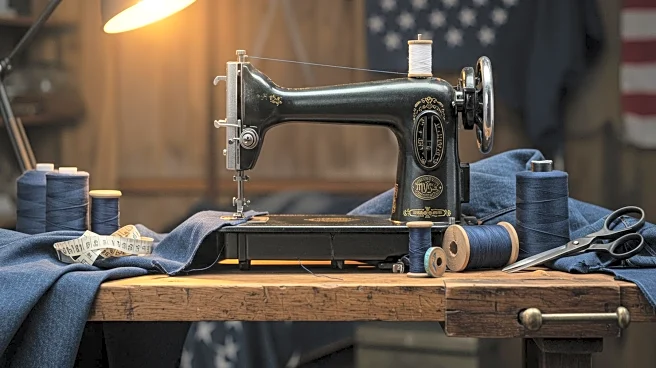What's Happening?
Round House Jeans, a longstanding denim manufacturer in Shawnee, Oklahoma, is facing significant challenges in producing affordable American-made jeans. Founded in 1903, the company is committed to using 100% American cotton and hand-sewing each pair of jeans, which are sold with a 'Made in USA' tag. Despite this commitment, Vice President David Antosh reveals that the profit margins on these jeans are extremely low, with production costs exceeding $66 per pair, while they are sold for $70. The company also faces difficulties in maintaining a skilled workforce, as many new hires leave due to the demanding nature of the job. To offset these challenges, Round House also sells jeans made in Bangladesh, which offer higher profit margins. The company embodies President Trump's 'America first' economic ethos but struggles with the realities of higher tariffs, scarce skilled labor, and outdated technology, which make overseas manufacturing more cost-effective.
Why It's Important?
The situation at Round House Jeans highlights the broader challenges faced by U.S. apparel manufacturers in competing with overseas production. Despite tariffs aimed at reshoring manufacturing, the cost of domestic production remains high due to labor and material expenses. This has implications for U.S. economic policy and the viability of domestic manufacturing. The company's struggle to maintain affordable pricing for American-made products reflects a larger trend where consumers associate 'Made in USA' with higher costs. This could impact consumer behavior and the sustainability of domestic manufacturing jobs. The reliance on higher-margin imported goods to subsidize American-made products underscores the complexities of maintaining a manufacturing base in the U.S.
What's Next?
Round House Jeans may need to explore strategies to enhance workforce training and retention to sustain its operations. The company might also consider adjusting its pricing model or seeking technological advancements to improve efficiency. As tariffs continue to affect import costs, the company will need to navigate these economic pressures while maintaining its commitment to American manufacturing. The broader industry may see shifts in sourcing strategies, with companies diversifying to offset tariffs rather than increasing domestic production.
Beyond the Headlines
The challenges faced by Round House Jeans raise questions about the future of American manufacturing and the cultural significance of 'Made in USA' products. The company's commitment to preserving its heritage and supporting local jobs reflects a deeper ethical dimension in business practices. The struggle to balance profitability with community support and heritage preservation may influence other manufacturers considering domestic production.










